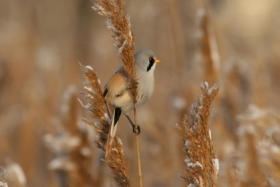 Among other grass plants, common reed (Phragmites australis) is considered to be a promising source of renewable energy in Hungary, Finland and Estonia. Among other grass plants, common reed (Phragmites australis) is considered to be a promising source of renewable energy in Hungary, Finland and Estonia.
First of all, naturally growing common reed is abundant in the coastal (sea, channels, lakes) areas of these countries, and it produces sufficient amount of dry biomass (3-15 t/ha). Secondly, since common reed is perennial fast growing plant, supplying with this source of energy can be practically unexhausted. Eventually, provision of reed is relatively cheep and, in addition to direct cutting of plants from the costal areas, dry reed material could be obtained as waste of roof manufacture and isolation material made from reed.
By compressing of dry reed biomass, it is possible to form compact briquettes (140-170kg/m3)or pellets (500-700 kg/ m3), which are more convenient to handle and to keep in store. Heat production at reed incineration is 15-18 MJ/kg, (depending on which season's harvest) and such reed briquettes and pellets could be used by small-and middle-sized farmers and also power plants. |

